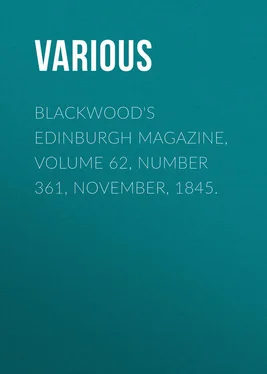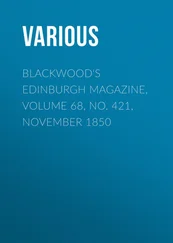Various - Blackwood's Edinburgh Magazine, Volume 62, Number 361, November, 1845.
Здесь есть возможность читать онлайн «Various - Blackwood's Edinburgh Magazine, Volume 62, Number 361, November, 1845.» — ознакомительный отрывок электронной книги совершенно бесплатно, а после прочтения отрывка купить полную версию. В некоторых случаях можно слушать аудио, скачать через торрент в формате fb2 и присутствует краткое содержание. Издательство: Иностранный паблик, Жанр: periodic, foreign_edu, Путешествия и география, на английском языке. Описание произведения, (предисловие) а так же отзывы посетителей доступны на портале библиотеки ЛибКат.
- Название:Blackwood's Edinburgh Magazine, Volume 62, Number 361, November, 1845.
- Автор:
- Издательство:Иностранный паблик
- Жанр:
- Год:неизвестен
- ISBN:нет данных
- Рейтинг книги:3 / 5. Голосов: 1
-
Избранное:Добавить в избранное
- Отзывы:
-
Ваша оценка:
- 60
- 1
- 2
- 3
- 4
- 5
Blackwood's Edinburgh Magazine, Volume 62, Number 361, November, 1845.: краткое содержание, описание и аннотация
Предлагаем к чтению аннотацию, описание, краткое содержание или предисловие (зависит от того, что написал сам автор книги «Blackwood's Edinburgh Magazine, Volume 62, Number 361, November, 1845.»). Если вы не нашли необходимую информацию о книге — напишите в комментариях, мы постараемся отыскать её.
Blackwood's Edinburgh Magazine, Volume 62, Number 361, November, 1845. — читать онлайн ознакомительный отрывок
Ниже представлен текст книги, разбитый по страницам. Система сохранения места последней прочитанной страницы, позволяет с удобством читать онлайн бесплатно книгу «Blackwood's Edinburgh Magazine, Volume 62, Number 361, November, 1845.», без необходимости каждый раз заново искать на чём Вы остановились. Поставьте закладку, и сможете в любой момент перейти на страницу, на которой закончили чтение.
Интервал:
Закладка:
"This is far enough, Mariano," said the former. "To the right, amongst the trees, you will find an old moss-grown bench, upon which I have often sat in happier days than these. There await my return."
"Let me accompany you further," replied Mariano. "There is no saying what reception the count may give you."
"I shall not see the count," answered Luis; "and if by chance I should, there is nothing to apprehend. But my plan, as I have already explained to you, is only to seek one moment's interview with Rita. I am well acquainted with the arrangements of the house, and you may depend that I shall be seen by no one whom I wish to avoid."
Mariano turned into the shrubbery, and Luis, with rapid but silent step, advanced towards the villa, favoured in his clandestine approach by the darkness of the night and the trees of the thickly-planted garden.
The house was a square edifice, without balconies, and the windows that were lighted up were those of the first floor. On the side on which Luis first approached the building, the windows were closed, but, upon moving noiselessly round to the front, he perceived one which the fineness of the weather, still mild and genial although at the end of September, had induced the occupants of the room to leave open. The sound of laughter and merriment issued from it; but this was presently hushed, and two voices, accompanied by guitars, began to sing a lively seguidilla , of which, at the end of each piquant couplet, the listeners testified their approbation by a hum of mirthful applause. Before the song was over, Luis had sought and found a means of observing what was passing within doors. Grasping the lower branch of a tree which grew within a few feet of the corner of the house, he swung himself up amongst the foliage. A large bough extended horizontally below the open window, and by climbing along this, he was enabled to look completely into the apartment; whilst, owing to the thickness of the leafage and the dark colour of his dress, there was scarcely a possibility of his being discovered.
The room was occupied by about twenty persons, the majority of whom were visitors, inhabitants of Tudela or of neighbouring country-houses. With four or five exceptions, the party consisted of men, for the most part elderly or middle-aged. One of the ladies and a young officer of the royal guard were the singers, and their performance seemed partially to interrupt the conversation of a group of the seniors who were seated round a card-table at the further end of the apartment. The cards, however, if they had been used at all, had long been thrown aside, and replaced by a discussion carried on in low tones, and with an earnestness of countenance and gesture, which gave to those engaged in it the appearance rather of conspirators than of friends met together for the enjoyment of each other's society. The ladies, and a few of the younger men, did not appear disposed to let the gravity of their elders interfere with their own pleasures. The song and the dance, the pointed epigram and witty repartee, all the varied resourccs which Spaniards know so well how to bring into play, and which render a Spanish tertulia so agreeable, had been in turn resorted to. When the seguidilla – during the continuance of which Luis had gained his post of observation – was brought to a close, there seemed to ensue a sort of break in the amusements of the evening. The younger members of the company, whose conversation had previously been general, separated into groups of two or three persons; and in more than one of those composed of the former number, the flashing eye, coquettish smile, and rapidly significant motions of the fan, bespoke the existence of an animated flirtation.
Two ladies, neither of whom could have seen more than eighteen summers, now left the sofa upon which they had been sitting, and, with arms intertwined, approached the open window. Luis remained motionless as the leaves that surrounded him, and which were undisturbed by a breath of wind. The ladies leaned forward over the window-sill, enjoying the freshness of the night; and one of them, the lively brunette who had taken a part in the seguidilla, plucked some sprays of jasmine which reared their pointed leaves and white blossoms in front of the window, and began to entwine them in the hair of her companion – a pale and somewhat pensive beauty, in whose golden locks and blue eyes the Gothic blood of old Spain was yet to be traced. Presently she was interrupted in this fanciful occupation by a voice within the room calling upon her to sing. She obeyed the summons, and her friend remained alone at the window.
No sooner was this the case than a slight rustling occurred amongst the branches of the tree, and the name of "Rita" was uttered in a cautious whisper. The lady started, and but half suppressed a cry of terror. The next instant the leaves were put aside, and the light from the apartment fell upon the countenance of Luis, who, with uplifted finger, warned the agitated girl to restrain her emotion.
"Santa Virgen!" she exclaimed, leaning far out of the window, and speaking in a hurried whisper, "this is madness, Luis. My father is unchanged in his sentiments, and I dread his anger should he find you here."
"I will instantly depart," replied Luis, "if you promise me an interview. I am about to leave Spain – perhaps for ever; but I cannot go without bidding you farewell. You will not refuse me a meeting which may probably be our last."
"What mean you?" exclaimed the lady. "Why do you leave Spain, and when? But we shall be overheard. To-morrow my father goes to Tudela. Be here at mid-day. Brigida will admit you."
She held out her hand, which Luis pressed to his lips. At that moment the clatter of a horse's hoofs, rapidly approaching, was heard upon the hard ground of the avenue. The lady hastily withdrew her land and left the window, whilst Luis again concealed himself behind the screen of foliage. Scarcely had he done so, when a horseman dashed up to the house, forced his steed up the three or four broad steps leading to the door, and, without dismounting or looking for a bell or other means of announcing his arrival, struck several blows upon the oaken panels with the butt of his heavy riding-whip. Whilst the party above-stairs hurried to the windows, and endeavoured to discern who it was that disturbed them in so unceremonious a manner, a servant opened the small grated wicket in the centre of the door, and enquired the stranger's pleasure.
"Is the Conde de Villabuena at home?" demanded the horseman. "I must see him instantly."
"The name of your Señoria," enquired the domestic.
"It is unnecessary. Say that I have a message to him from friends at Madrid."
The servant disappeared, and in another moment his place was occupied by a grave, stern-looking man, between fifty and sixty years of age.
"I am Count Villabuena," said he; "what is your business?"
The stranger bent forward over his horse's mane, so as to bring his face close to the wicket, and uttered three words in a tone audible only to the count, who replied to them by an exclamation of surprise. The door was immediately opened, and Villabuena stood beside the horseman.
"When?" said he.
"Yesterday. I have ridden night and day to bring you the intelligence, and shall now push on to the interior of Navarre. At the same time as myself, others of our friends started, north and south, east and west. Early this morning, Santos Ladron heard it at Valladolid, and Merino in Castile. To-day the news has reached Vittoria; this night they will be at Bilboa and Tolosa. It is from the northern provinces that most is expected; but 'El Rey y la Religion' is a rallying-cry that will rouse all Spaniards worthy of the name. You are prepared for the event, and know what to do. Farewell, and success attend us!"
Читать дальшеИнтервал:
Закладка:
Похожие книги на «Blackwood's Edinburgh Magazine, Volume 62, Number 361, November, 1845.»
Представляем Вашему вниманию похожие книги на «Blackwood's Edinburgh Magazine, Volume 62, Number 361, November, 1845.» списком для выбора. Мы отобрали схожую по названию и смыслу литературу в надежде предоставить читателям больше вариантов отыскать новые, интересные, ещё непрочитанные произведения.
Обсуждение, отзывы о книге «Blackwood's Edinburgh Magazine, Volume 62, Number 361, November, 1845.» и просто собственные мнения читателей. Оставьте ваши комментарии, напишите, что Вы думаете о произведении, его смысле или главных героях. Укажите что конкретно понравилось, а что нет, и почему Вы так считаете.












